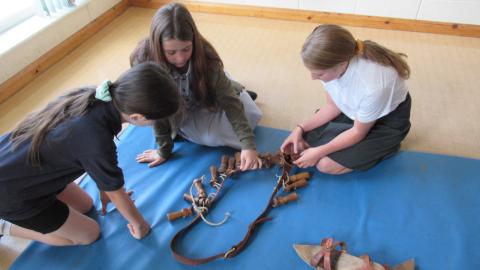Within our federation, we value the individuality of all our children. We are committed to giving all our children every opportunity to achieve the highest of standards in all that they do, underpinned by our deeply Christian ethos. We do this by taking account of pupils’ varied life experiences and needs. We offer a broad and balanced curriculum and have high expectations for all children. Their achievements, attitudes and well-being matter and we ensure that they discover their gifts and talents given to them by God and experience ‘life in all its fullness’ (John 10:10).
Our school strives to offer a curriculum that gives children the best possible start to their education by developing their independence, curiosity, imagination, spirituality and desire to learn. We strive to value our differences within the school, and the wider community.
We believe our curriculum prepares our children well for their secondary education and later life and encourages them to find out more about the world around them. We ignite curiosity and inspire a love of learning through memorable experiences and exciting challenges, which prepare our children for an ever-changing world. We want all of our children to be well-rounded, educated citizens, and so we strive to provide them with opportunities beyond the classroom.
Adhering to the National Curriculum, we endeavour to enrich the curriculum wherever possible. Our children are taught in classes, small groups or individually, according to their needs, within the framework of the National Curriculum. A variety of teaching styles are used in school, based on good practice in which teachers continually reflect on their teaching. We seek to ensure that our curriculum is innovative, promoting high standards to provide the best in primary school practice.
Our youngest children are supported and nurtured as soon as they start school in Early Years. Children begin to develop their knowledge, thinking and skills through play-based activities and focused sessions that begin to build children’s knowledge of phonics and number and the prime areas. The children develop a proficiency to work independently and engage well with others, learning about the world around them.
Developing reading for all children is a key priority and this continues throughout school. Our curriculum has been designed with progression in mind, ensuring that existing knowledge and skills are built on over time.
Teachers plan differentiated, well-sequenced units of work, with regular revisits and recalls integrated into planning, to support the development of pupils’ long-term memory. Pupils are able to complete tasks, apply skills and link knowledge to solve problems, create original designs, make links and connections between subjects and information. We believe a curriculum with breadth and depth should give equal value to each subject, and our knowledge-rich approach has been embedded across the foundation curriculum. The expectation is that our pupils will move through all areas of the curriculum at broadly the same pace, and we pride ourselves in our ability to prioritise provision for SEN and disadvantaged children. Pupils who grasp concepts rapidly are challenged from the outset and throughout a lesson.
Assessment is an integral part of planning and teaching and learning. Our learning culture is built on assessment for learning and the belief of the vital importance of questioning when providing feedback. A range of assessment is used to check children’s progress throughout each year.
We use our catchment area to our advantage; we serve the villages of Chapel Haddlesey, West Haddlesey, West Bank, Temple Hirst and Hirst Courtney and benefit from our attachment to the St Wilfred’s Church, Brayton and the village communities. However, we also serve a far wider community of pupils who travel in from Carlton, Beal, Birkin, Whitley, Eggborough, Burn, Thorpe Willoughby, Selby and Brayton.
At Chapel Haddlesey CE Primary School, we aim for our pupils to feel confident in their own cultural identity. We achieve this by introducing pupils to their local area and by making links with our local community, through our parents and pupils, in order to understand our own diversity and cultures. We make links to our local area, by researching, visiting and discussing areas of local importance, such as the local canal, hydro station, the River Ouse and Drax Power Station. We invite visitors into school, such as local writer Christina Gabbitas to raise aspirations, encouraging them to explore the rich tapestry of opportunities their local community can offer them. We highlight the importance of both recent and historical people from within our communities and introduce pupils to famous people, who came from, or were born in Selby, such as Henry I (King of England), Gareth Ellis (Rugby League) and Eden Taylor-Draper (actor).
We strongly believe in the strength of our foundation curriculum and, with the interweaving of British values such as tolerance, mutual respect and individual liberty, we are enabling children to be reflective members of the community who will begin to recognise the impact we are having on generations to come. We then ensure that our children are aware of, appreciate and celebrate the different ethnicities, abilities, social classes, genders, sexualities and cultures from around the world. Only by really learning what these terms mean will our learners be able to develop a character that prepares them for living in the community demonstrating tolerance, equality and broader cultural awareness.
The aim of our curriculum offer is clear: that each child leaves our school with the skills and knowledge needed to live a happy, healthy and productive life. We aim for our children to thrive whilst standing shoulder to shoulder with other members of society, making a positive contribution to the wider world.

